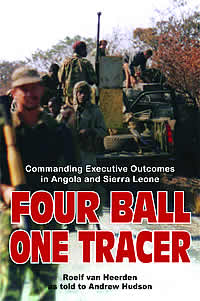This is really not news if we remember my prior posts about the rise of private security in China. But what I like about stories like this is that they identify the up and coming players in the PSC market there. Or a PSC that could easily transition into more of a PMC role for ventures in places like Africa.
Yun Hai Elite Security was mentioned in this article and they have done some big name work for celebrities visiting China. They also give their guys a ton of training and they seem to attract some high end soldiers and police. These are the companies I like to watch, just because it is not that big of a step for them to cross into the realm of doing what they do in other countries and regions. China also allows these companies to exist for a reason, and these companies are really not private per se.
The other thing I have been watching lately is China’s intense focus on Africa. Businessmen from China are canvassing that continent and doing all they can to establish roots. With the amount of projects and money they bring, there is also the security required to bring peace and stability to those endeavors. That security will either come from Chinese security companies, local police or military they have agreements with, or regional private security companies–or folks that specialize in providing security on the African continent.
In other words, I expect that the Chinese will be really hitting up South African companies and individuals for all types of work. Either protecting projects or making security assessments. I could also see the Chinese contracting with companies to help professionalize the local police and military that the Chinese would make agreements with, or to help advise Chinese security companies. The Chinese are not at all afraid to set up shop in the crappiest places of Africa to get what they need. In order to make that a success, they need the right people that know how to solve problems there.
What I am interested in though is what will the Chinese do in some of these places when the local rebels or whatever group, begin to attack and give problems to these projects. Would they contract a PMC to take care of problems? Would they soup up a local military with weapons and training to go on the offensive? How far will the Chinese go in to order to restore commerce and protect their business ventures in Africa? Who knows and it will be something to watch as these new ‘East India Companies‘ of the modern era do their thing. –Matt
Edit: 07/05/15– I found a great video by Vice about female bodyguards in China that I had to share here on this post. It also has extensive footage of Yun Hai Elite Security and how they train folks. Check it out.
China’s new status symbol: a bodyguard
Hannah Gardner
Jan 8, 2012
In a badly lit housing complex on the edge of Beijing, one building burns bright late into the night.
This hall, once a community centre for workers at Beijing’s airport, is now home to Yun Hai Elite Security – one of hundreds of companies that have sprung up across China in recent years to provide bodyguards for the country’s newly minted rich.
Here until 10 every evening, six days a week, former soldiers and athletes learn the skills required to protect people who are increasing resented in this nominally communist county.
“I don’t lack clients,” says Xin Yang, one of Yun Hai’s founders and a former member of the special services in the People’s Liberation Army (PLA).
“I have a waiting list for my bodyguards. Our trainees have a 100 per cent employment rate.”
Just over a decade ago there was little call for a business like Mr Xin’s. Politicians were more respected, international stars rarely visited and the county didn’t have a single billionaire.
Now, China is home to at least 243 individuals with assets worth more than US$1 billion (Dh3.67bn) and last year the socialist state produced its millionth millionaire.

